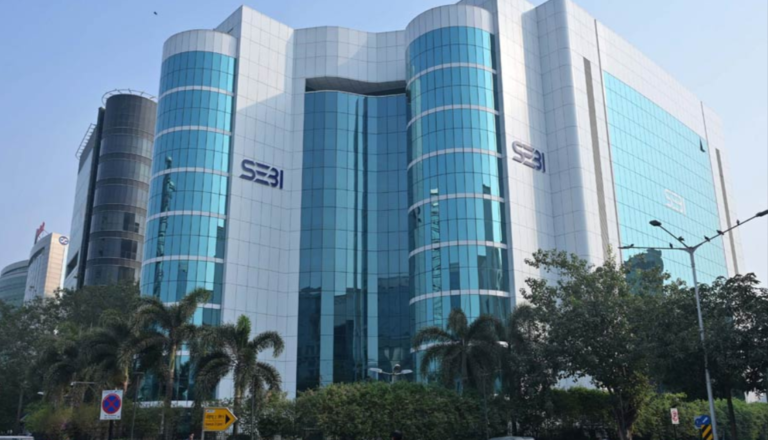National Stock Exchange of India Ltd (NSE) is the biggest money exchange in the Indian market. It was established in 1992 on the recommendation of the High-Powered Study Group, national stock exchange of india which was founded by the Indian government to provide solutions to simplify participation in the stock exchange and build it more accessible to all interested parties in 1994. The NSE introduced electronic commerce within the Indian stock exchange market.
NSE offers a platform to companies to increase capital. Investors will access equities, currencies, debt, an open-end investment company unit on the platform. In India, foreign companies can raise capital using the NSE platform through initial public offerings (IPOs), Indian Depository Receipts (IDRs), and debt issuance.
| Overview | |
| Type | Stock Exchange |
| Headquarter | Mumbai, India |
| Founded | 1992 |
| Owner | Various domestic and international financial institutions, public and privately owned entities and individuals |
| Chairperson | Girish Chandra Chaturvedi |
| MD & CEO | Vikram Limaye |
| Currency | Indian Ruppe |
| No. of listings | 2,002 |
| Market Cap | US$ 3.4 trillion (2021) |
| Volume | US$ 1.2 trillion (2020) |
| Indices | NIFTY 50, NIFTY Next 50, NIFTY 500 |
NSE was the primary exchange within the country to supply a contemporary, machine-driven screen-based electronic trading system. That offered straightforward commerce facilities to investors unfold across the length and breadth of the country. Vikram Limaye is the administrator and CEO of NSE.
How does NSE work
NSE provides the investor with a transparent fall or rises in the price of securities through its completely electronic screen. It informs the investors regarding the current market stature, in the order, they will arrange ways of investment and make fruitful returns. The NSE ensures an easy way of trading through getting associated with the depository- NSDL.
This allows investors to hold, trade, and invest in securities. Investors are provided with the option of choice, and the freedom to make their call of trade digitally. NSE create trading easier as it is electronic, it created trading more transparent. More investors can invest as the basic requirements to qualify as an investor are much simple. This led to additional investments and development in the capital market.
Trading in the NSE
Transparency and visibility
The first thing that needs to check is the performance of the stock over the years. Based on that, you can assume whether you should buy, sell, or hold a particular stock. NSE provide complete visibility. You can get tons of stats that can give you its performance, and there are much news feeds where you can get a lot of information about the companies.
Volume Matters
According to a survey back in 2015, the stocks listed within the NSE are fourth within the world once we compare the full share volume. Therefore, the stock value gets wedged and tends to urge low. Whenever once you trade, you are doing bear less expense for commercialism. If you are doing the proper deals, the stock market won’t be a roadblock for you to earn additional.
Seamless Order Placing
When you perform deals within the NSE, everything is machine-driven. You won’t need to submit any record that must get verified. the complete method is autonomous. Your headache starts and ends at creating correct deals whereas commercialism. an added exciting feature is the rate of order inserting.
The complete method is fast and strong, and most of the time gets wiped out minutes. That’s why it breaks the biggest no. of trades in a very day record virtually every alternative day.
Trade via many popular indices
Some of the most popular indices from the NSE are the Nifty 50 index and Nifty 100 index, which are front liners. Prime of that, there are slap-up Next fifty index, slap-up Midcap fifty index, slap-up Small cap 250 index, and Bharat Vix index to match the standing. Excluding that, there are many indices that the NSE additionally deals with that are thematic, strategy, hybrid and stuck income-based.
Various Market segments that the NSE deals
Equity
The NSE’s primary job is to avail trading facilities to deal in companies equity assets. Now, it can be equity shares, trading via several indices, mutual funds, and more. The core plan is to extend ROI.
Equity Derivatives
The second segment related to the NSE is Derivatives. There are tons of International indices that fall under this category. National Stock Exchange The Dow Jones and CNX 500 are two of the best examples. In recent years, it’s additional new options index futures and derivative contracts.
Debt
All the core mutual funds, exchange-traded funds, and many more fall under this category. Here you have to deal with corporate bonds, company bonds, and securitized products. The Debt segment provides a chance for retail investors to invest in company bonds on a liquid and clear exchange platform.
Trading schedule
Trading on the equities segment takes National Stock Exchange place on all days of the week. The market timings of the equities segment are-
-
Pre-open session
- Order entry & modification Open 9:00 hrs
- Order entry & modification close 9:08 hrs
With random closure within the last one minute. Pre-open order matching starts right away when the shut of pre-open order entry.
-
Regular trading session
- Normal/Retail Debt/Limited Physical Market Open: 9:15 hrs
- Normal/Retail Debt/Limited Physical Market Close: 9:30 hrs.
- Aftermarket hours: 16:00 – 09:00 hrs
Exchange-Traded Fund (ETF) and Derivatives on NSE
The following products are trading national stock exchange of india on the Nifty 50 Index in the Indian and international market-
- 7 Asset Management Companies have launched ETF on Nifty 50 index which is listed on NSE.
- 15 index funds have been launched on the Nifty 50 index
- Unit-linked products have been launched on the Nifty 50 Index by several insurance companies in India.
- World Indices
Derivatives Trading on Nifty 50 Index-
- Futures and Options trading on Nifty 50 Index
- Trading in Nifty 50 Index Futures on Singapore Stock Exchange (SGX)
- Trading in Nifty 50 Index Futures on Chicago Mercantile Exchange (CME)
Financial literacy
NSE has collaborated with many universities like Gokhale Institute of Politics & economic science (GIPE), Pune, Bharati Vidyapeeth Deemed University (BVDU), Pune, Guru Gobind Singh Indraprastha University, Delhi, the Ravenshaw University of Cuttack and Punjabi University, Patiala, among others to supply MBA and BBA courses.
NSE has additionally provided mock market simulation computer code referred to as NSE Learn to Trade (NLT) to develop investment, trading, and portfolio management skills among scholars. The simulation computer code is extremely like the computer code presently being employed by the market professionals and helps students to be told the way to interchange the markets.
NSE conducts online examinations and awards certification, below its Certification in monetary Markets (NCFM) programs. At present, certifications area unit on the market in forty-six modules, covering different sectors of economic and capital markets, each at the beginner and advanced levels. The list of assorted modules will be found on the official website of the NSE Asian nation. national stock exchange of india Additionally, since August 2009, it’s offered a short course referred to as NSE Certified Capital Market Professionals (NCCMP).
Promoters of NSE
Promoters group of National Stock Exchange list of companies given below-
- Industrial Development Bank of India Ltd.
- ICICI Bank Ltd.
- SBI Capital Markets Ltd.
- The New India Assurance Company Limited
- Bank of Baroda
- General Insurance Corporation of India
- Stock Holding Corporation of India Limited
- State Bank of India
- Industrial Finance Corporation of India Limited
- Life Insurance Corporation of India
- Indian Bank
- IL & FS Trust Company Limited
- Infrastructure Development Finance Company Ltd
- Union Bank of India
- Canara Bank
- National Insurance Company Limited
- United India Insurance Company Limited
- The Oriental Insurance Company Limited
- Punjab National Bank
- Oriental Bank of Commerce
- Corporation Bank
NSE Advantages
- It has an automated trading system promising consistency and transparency in the trade.
- The system provides a seamless trading experience and ends information post the trade.
- The exchange’s online portal provides all corporate announcements and results. This proves the very fact that listing on NSE will promise reach, true.
- This stock exchange also provides a trading platform that extends all over the country. The investors can avail themselves national stock exchange of india of any trading facility provided by this exchange.
- The exchange makes use of advanced communications technologies and provides instant reach, which can be accessed through any given location.
Trade Statistics
NSE provides the investor with services and education. It helps them in dealing with all the issues that are provided for trade via their platform. This body conjointly believes that it is valuable to coach and empower investors. There are several investor service centres run by NSE and equally spread across the country.
History
NSE was incorporated in the year 1992 to bring about transparency in the Indian equity markets. Instead of trading memberships being confined to a group of brokers. National Stock Exchange ensured that anyone who was qualified, experienced, and met the minimum financial requirements was allowed to trade during this context.
NSE was sooner than its time once it separated possession and management of the exchange beneath SEBI’s superintendence. The key domestic investors embrace life assurance Corporation, bank of the Republic of India, IFCI restricted, IDFC restricted and Stock Holding Corporation of Republic of India restricted. Key world investors embrace Gagil FDI restricted, GS Strategic Investments restricted, SAIF II SE Investments Mauritius restricted, Aranda Investments (Mauritius) Pte restricted, and PI Opportunities Fund.
NSE was instrumental in making the National Securities facility restricted (NSDL). That permits investors to firmly hold and transfer their shares and bonds electronically. It permits investors to carry and trade as few mutually share or bond. This not created holding monetary instruments convenient however additional significantly, eliminated. The necessity for paper certificates and greatly reduced incidents involving solid or pretend certificates and deceitful transactions that had overrun the Indian stock exchange.
NSE Emerge
NSE Emerge is NSE’s new initiative for SME & Startup corporations in India. These corporations will get listed on National Stock Exchange without an Initial public offering (IPO). This platform can facilitate SME’s & Startups connecting with investors and help them with increasing funds. In August 2019, the 200th company was listed on NSE’s SME platform.
Conclusion
NSE has played a big role in encouraging and serving investors invest. It has huge volumes of shares and is a hub of opportunities national stock exchange of indiafor companies and investors alike. It also bridges the gap between the two facilitating smooth trading and investments.













